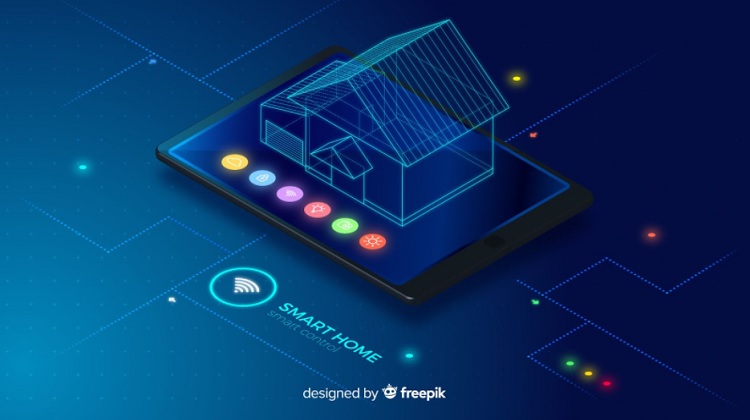
A home automation system is a security and convenience service that can offer remote management of all your appliances, doors and windows, lights, and other features in your home.
Most systems use wireless connectivity to control everything in the home—both inside and outside. This article will explore what these systems are and their potential future.

What is a home automation system?
Home automation is the process of automating the control of the environment in your home. Home automation systems are designed to make it easier for homeowners to use their homes just by giving voice commands or touching a button on a tablet, smartphone, or another device.
Simply put, home automation systems allow you to control everything in your home by an app. This includes lights, windows, and blinds. Home automation systems typically comprise a couple of key components.
First, an Internet-connected hub (or controller) is used as the central brain of the system. The hub then communicates with a number of sensors and actuators (i.e., the devices that do the work).
How does a home automation system work?
A home automation system is a technology that controls other appliances in your home. It also monitors the home’s security and environmental conditions. The idea is to make your life more comfortable by allowing remote monitoring, control, and automation of other devices in your house.
The home automation system can be a stand-alone system or integrated with other devices – namely, security systems, the heating and cooling systems in the house, and the garage door. The control system that manages a home automation system can be installed inside or outside the house.
It is connected to your home’s security and heating and cooling systems. The control system can be controlled from a remote location via telephone voicemail, or the Internet.
Home automation is one of the biggest Digital transformations which is going to change our way of living in the future as everything will be automated, We just need to sit and command.
Benefits of a home automation system
Home automation systems are a great way to make your home safer, more comfortable, and more convenient. You can program a schedule that will turn lights on and off, open and close the garage door, and even adjust the thermostat while you’re away.
The system can also be programmed to notify you if there is a power outage or someone opens a door when they should not have. What do I need to have installed?. You will need a complete home automation system, which consists of the main system and several add- ons.
The main system, which can be wired into the electrical system or controlled by an infrared remote, has a built-in computer that coordinates all the devices in the home. It also has a modem that is compatible with the home’s telephone line to control commands and receive information from the Internet.
Future of home automation
We cannot say for sure what the future holds but it is likely that there will be a time when we will not even need to touch our homes as all the tasks can be done remotely.
The home security industry has experienced a dramatic shift to remotely controlled and automated systems and these innovations are now infiltrating other sectors such as heating/cooling, appliances, and lighting.
This article is part of our series about the future and we would like to hear from you. What do you think the future will hold for home automation?
Is the market saturated with home automation products?
The home automation market is still in its infancy, and the majority of households are just beginning to adopt this technology.
IHS Markit estimates that by 2020, there will be more than 180 million homes globally with smart-home devices. In 2018, the market will exceed $37 billion.
How much does it cost to automate your entire house?
For those of us who are short on time and energy, it’s tempting to automate as much as possible. And the good news is that today’s home automation systems can help.
They can be quite expensive to install and configure, but ongoing costs vary depending on your needs. This is a question you’ll need to answer for yourself by assessing what you want and need from automation in your home and how much you’re willing to invest upfront.
If you want to automate the majority of your house, you’ll need to expect to pay in the thousands. The price of a home automation system depends on several factors.
The number of devices you’ll be adding is one major factor, but so is the complexity of automating each device. For example, you’ll pay more to automate a dimming light switch than you will to control a door lock.
Conclusion
The future of home automation is not far off, and it will undoubtedly alter the way we live in our homes. We may be able to use voice commands to turn on the lights when we walk in or tell Alexa to start our coffee maker. We may even be able to monitor things like water levels in our tank remotely.
Regardless of what happens with this technology, one thing is certain: it will change how we think about and interact with the world around us.
Author Profile
Latest entries
 Digital MarketingJuly 5, 2025How to Choose the Right Plugins for Your Creative Agency
Digital MarketingJuly 5, 2025How to Choose the Right Plugins for Your Creative Agency Digital MarketingJuly 4, 2025How to Choose an SEO Agency: 7 Tips & Tricks
Digital MarketingJuly 4, 2025How to Choose an SEO Agency: 7 Tips & Tricks Artificial IntelligenceJuly 1, 2025How AI and Automation Are Transforming Cloud Server Security
Artificial IntelligenceJuly 1, 2025How AI and Automation Are Transforming Cloud Server Security Digital MarketingJune 28, 2025How to Set Conditional Free Shipping Thresholds in WooCommerce
Digital MarketingJune 28, 2025How to Set Conditional Free Shipping Thresholds in WooCommerce